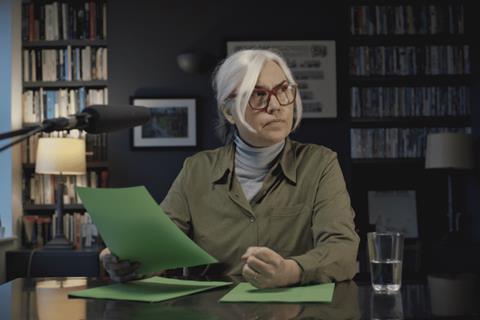Christine Molloy and Joe Lawlor’s ‘profound and poetic’ doc explores the changing relationship between people and place

Dirs/scr: Christine Molloy, Joe Lawlor. Ireland/UK. 2022. 89mins
It’s a remarkably far-reaching picture, this latest essay film from the Irish artistic partnership of Christine Molloy and Joe Lawlor. Particularly so, given that the filmmakers, who are also the narrators and two of the many subjects of the picture, spend much of it desk-bound, speaking to camera, in a home office in their London house. But the ideas take flight: Brexit, dental quirks, the Irish famine, Lawlor’s mother’s struggles with mental health, the tricky relationship that the Irish have with their language, and the story of Rose Dugdale, a wealthy British debutante-turned-radical Irish republican. It’s a fascinating, intellectually agile work that manages to be both intensely personal while also relevant to anyone who has ever questioned whether they really know their home country.
An idiosyncratic and slightly wayward approach
This is the second documentary from Molloy and Lawlor (who have also made features Helen and Rose Plays Julie) and a follow-up to their 2016 non-fiction picture Further Beyond. Both films take an idiosyncratic and slightly wayward approach to explore themes of migration, the nature of film locations and geographical spaces, and whatever else sparks their curiosity about the world. As befits a film that is, in part at least, about a journey, The Future Tense has enjoyed a suitably meandering route through the festival circuit, arriving in Dublin following a premiere in Telluride and a berth in the documentary competition of the London Film Festival, among others. Mubi holds UK and Irish rights to the film.
There are so many ideas on this whistle-stop tour of personal and national identity that to summarise them all would be a thankless task, and would fail to convey just how satisfying this looping, questioning journey is. So perhaps it’s best to start where the film does, with the couple and their teenage daughter taking a plane journey between London and Dublin. It’s one that Molloy and Lawlor have done numerous times over the years, a short hop that links their adopted home of London with Dublin, the city of their births. But this time, there is more baggage.
The post-Brexit surge of populism and nationalism has shifted the landscape of England, raising the question for Molloy and Lawlor of whether it is still where they want to make their home. This journey is, in part, an exploration of the idea of relocating to Ireland. It’s also a research trip for the film they have just shot called Baltimore about the terrorist Rose Dugdale, which takes in the squat little cottage where she holed up following a notorious art heist, and her route to the coast where she hoped to evade the law.
But the paths of other, earlier journeys are mapped onto Molloy and Lawlor’s current one. There’s Lawlor’s mother’s route, which took in New York and London before returning to Ireland. And the couple’s own migration, which took them from Ireland to rural Devon, and an art college in Axminster. There, there’s a brief debate with fellow former students about the semiotic significance of the Union Jack flag on a pair of underpants versus the simpler George Cross, which, says Lawlor with a degree of relish, evokes the image of England as an anus discharging blood.
Throughout it all is the idea that places can take on traits and personalities – the writer Kevin Barry speaks of a favourite road in Co Sligo which has a “mischievous, madcap air”. This blend of psycho-geography and anthropomorphisation of landscape is a rich seam, which Molloy and Lawlor mine to profound and poetic effect.
Production company: Desperate Optimists
International sales: Visit Films info@visitfilms.com
Producers: Christine Molloy, Joe Lawlor
Cinematography: Joe Lawlor
Editing: Joe Lawlor
Music: Stephen McKeon
Main cast: Joe Lawlor, Christine Molloy, Molly Rose Lawlor, Derry Lawlor, Aidan Gillen, John Lawlor, Kai Saywaw, Mary O’Gara























